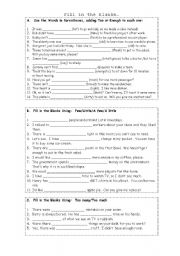
|
Too/Enough/Little/Few/Too much/Too many -- Fill in the Blanks
This is another in my series of Too/Enough/Few/Little worksheets, designed to give students practice with these terms. There are three sections here, the first with Too/Enough, the second with Few/Little/A few/A little and the third with Too much/Too many. Answer Key provided on second page.
Level: intermediate
Age: 14-17
Type: worksheet
Downloads: 82
|
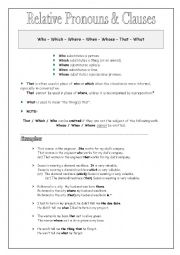
|
Relative Pronouns & Clauses Explained (Defining)
This is a guide to understanding how the relative pronouns are used in defining relative clauses. It is intended to be a simple explanation with examples before doing practice.
Level: intermediate
Age: 14-17
Type: grammar-guide
Downloads: 63
|
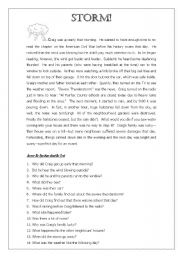
|
Storm Text
This is an original text I wrote to practice the past simple and past continuous with vocabulary related to the weather. Students can read out loud to practice pronunciation before answering the 14 comprehension questions.
Level: intermediate
Age: 13-17
Type: reading
Downloads: 57
|
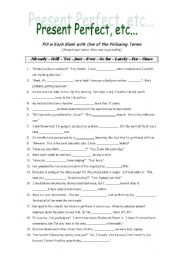
|
Terms Frequently Used with the Present Perfect
Here there are twenty sentences (sometimes pairs of sentences) to be completed with the terms: Already - Still - Yet - Just - Ever - So far - Lately - For - Since. The sentence structures are quite varied, but the present perfect is used throughout. Answer Key provided.
Level: intermediate
Age: 14-17
Type: worksheet
Downloads: 51
|
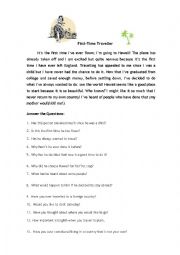
|
First-Time Traveller Text
This is a short text which emphasizes the Present Perfect. It is designed for students who have already started studying this tense. After the text (which may be used first as a listening exercise), there are thirteen comprehension questions.
Level: intermediate
Age: 13-17
Type: reading
Downloads: 41
|
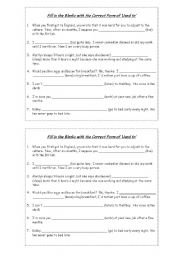
|
Used to, be used to, get used to
These are 7 situations which must be completed with a form of �used to�. The exercise is short and there are two on the page. Answer key provided.
Level: advanced
Age: 14-17
Type: worksheet
Downloads: 35
|
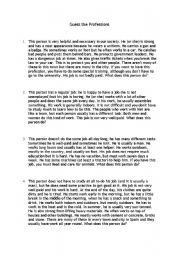
|
Professions/Jobs -- Riddles
These are lengthy descriptions of four professions to be read aloud in class for pronunciation practice and for comprehension. Students must discover which occupation each riddle describes. As a follow-up, I have students write their own description of different professions.
Level: intermediate
Age: 11-17
Type: reading
Downloads: 26
|
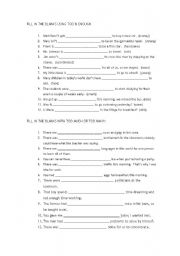
|
Too & Enough, Too much & Too many Fill in the Blanks
This worksheet has two sections. The first one is to fill in with too and enough and the second one is to complete with too much and too many. Not too difficult before moving on to more complicated worksheets. Answer key provided.
Level: intermediate
Age: 12-17
Type: worksheet
Downloads: 25
|
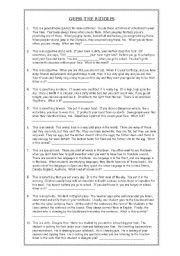
|
Reading Comprehension Riddles
These are ten riddles to test students� reading comprehension. Vocabulary is varied. I made it for my group of 6th graders. Answer Key provided.
Note: I allow students to write the answers in their native language if they don�t know them in English--after all, I am grading reading comprehension, so if they understand the description, that�s g...
Level: elementary
Age: 11-14
Type: reading
Downloads: 25
|
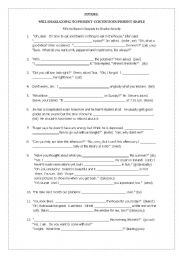
|
Future Fill-in
These situations are slightly more difficult than the other fill-in worksheet I�ve submitted on the future. Students must fill in the blanks with the correct form of the verb, be it using Shall, Will, To Be Going to, Present Simple or Present Continuous.
Level: intermediate
Age: 14-17
Type: worksheet
Downloads: 24
|